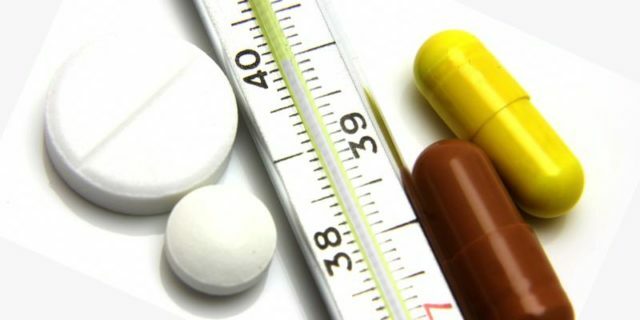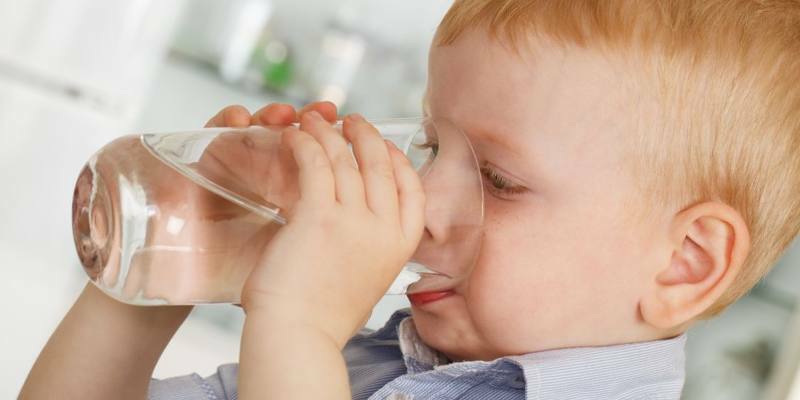
Page Contents
- 1 Reduced body temperature: pathology or norm?
- 2 Symptoms of hypothermia
- 3 What causes a decrease in body temperature?
- 4 Reasons for decreased body temperature
- 5 Viral and bacterial infections
- 6 Dehydration
- 7 Internal bleeding
- 8 Sepsis( blood poisoning)
- 9 When urgent medical attention is needed?
Hypothermia or low body temperature, especially persistent for a long time - a good reason to call a doctor. Causes of decreased body temperature in an adult may be different and not always related to banal hypothermia or overwork. In addition to completely innocuous factors, this symptom can cause serious pathologies or a hidden infection process. To understand why the temperature of the body goes down, it is necessary to undergo a full medical examination and take measures to eliminate health problems.
Decreased body temperature: pathology or norm?

Everyone knows that the indicator of normal body temperature is the value of 36.6 °.It may vary slightly during the day, depending on the time of day, physical activity, age and even mood. This is a natural process, connected with the features of thermoregulation of the body.
A dangerous deviation is a decrease in body temperature below 35 ° C.Moreover, many simply ignore this alarming sign, believing that the accompanying weakness, apathy, general deterioration of well-being are caused by banal overwork. However, hypothermia is no less dangerous than high temperature, since it can be a sign of depletion of the nervous system or evidence of hidden diseases.
Sometimes a slight deviation of body temperature downward can be an individual feature of the body. If this person feels fine, then you should not worry. But when you feel a decline of strength, weakness, and body temperature of 35 ° C and stays at this level stably, it is worthwhile to see a doctor.
Symptoms of hypothermia

Lowering body temperature is accompanied by the following symptoms:
- pallor, cold to touch skin;
- decline of strength, reduced efficiency, lethargy and apathy;
- chills, increased sweating;
- retardation, drowsiness;
- reduced blood pressure, a decrease in heart rate;
- dizziness.
When the body temperature drops below 34 ° C there is a strong chill, a weak pulse, speech becomes vague, movements are slow. With the fall of blood pressure a person can lose consciousness. A critical condition that can lead to death is a sharp drop in body temperature to 32 ° C.
What causes a decrease in body temperature?

In medicine, all the reasons provoking a decrease in temperature, it is common to divide into two categories:
- external( exogenous) factors;
- internal( endogenous) factors.
Among the most common exogenous causes are:
- hypothermia of the body;
- taking certain medications( hypnotics, sedatives);
- fasting, compliance with rigid diets;
- unbalanced diet, beriberi;
- intoxication of the body with food, alcohol, drugs, chemicals;
- chronic fatigue syndrome, overwork;
- recovery period after a severe illness;
- age.
Internal causes of hypothermia are:
- low hemoglobin( anemia);
- changes in the hormonal background during pregnancy;
- diseases of the endocrine system associated with impaired thyroid function;
- chronic diseases of internal organs( liver, kidneys, adrenal glands);
- parasitic infections;
- low blood pressure( arterial hypotension);
- immunity decline, immunodeficiency states( HIV);
- oncological diseases;
- diabetes mellitus, hypoglycemia( lowering of blood sugar level);
- infectious diseases;
- dehydration of the body.
Reduced body temperature is often noted in the elderly. In adolescents, this symptom is manifested in autonomic disorders and changes in the hormonal background. Let us consider in more detail the most common causes that cause hypothermia.
Causes of reduced body temperature
Vegetosovascular dystonia
Malfunctions in the vegetative system often cause a violation of body thermoregulation and along with a low temperature are accompanied by weakness, pressure jumps, nausea, dizziness, attacks of severe headache( migraine), combined with intolerance of bright light and loudsounds.
If you have this symptom, you should seek medical help and consult with a therapist, neurologist, endocrinologist, psychotherapist.
Iron deficiency anemia
A decrease in the hemoglobin level in the blood immediately reflects on overall health and leads to a drop in efficiency, lethargy, weakness, pallor of the skin, hypothermia, constant chilliness.
To determine the deficiency of iron in the body will help the blood test for hemoglobin. If the suspicion of anemia is confirmed, the doctor will prescribe medications with iron( Sorbifer, Ferretab, etc.), which should be taken for 2 - 3 months.
Viral and bacterial infections
The recovery period after a recent illness is always accompanied by a general weakness, since the immune system is just starting to recover and it takes time for the person to recover completely after the illness. And if in the early days the disease manifests itself with a strong fever, then as recovery is often in the morning there is hypothermia.
During this period, subfebrile temperature is often noted during the day and decreased at night. That is, in the daytime the temperature is kept at 37.0-37.5 ° C, and at night it drops to 35 ° C and is accompanied by strong weakness and increased sweating. The causes of low temperature in a child are often associated with infectious diseases.
Often after a cold( ORZ), the body temperature of the baby decreases and there are characteristic signs - weakness, pale skin. This condition is associated with imperfection of the body's thermoregulation system, which is not yet fully formed in children under 3 years old. In this case, the body temperature can be kept at 35.5 ° C, but parents should not panic about this. It is enough to dress a child warmer and give him a hot drink more often.
Pregnancy
Causes of low temperature in women often lie in the fluctuations of the hormonal background before the menstrual period or during the onset of menopause. Often the development of hypothermia is promoted by fluctuations in the hormonal background during pregnancy.
These conditions do not cause any special concern, because as the woman's body adapts to the new condition, her state of health comes back to normal.
Subcooling of the body
For prolonged exposure to cold winds, icy water, or cold frost, the body suffers from hypothermia. At the same time, metabolic processes are slowed down, heat transfer increases and body temperature decreases, that is, a person freezes. The skin becomes cold to the touch, movements slow down, the pulse and respiration rate decreases, and chills appear.
If the victim is warmed up, unpleasant symptoms quickly disappear. To help come rubbing, hot drink, warm bed. In severe cases, the victim needs medical attention, since severe frostbite leads to severe health consequences.
Dehydration of
Food poisoning or intestinal infections cause intoxication of the body, frequent attacks of vomiting, diarrhea, leading to massive loss of fluid and dehydration of the body. This condition is accompanied by severe weakness and hypothermia. In this case, the victim needs urgent medical assistance.
Given the severity of the condition, the doctor will prescribe medication at home, or send the patient to the hospital. When dehydration is important in time to provide the necessary help, otherwise severe consequences are possible - convulsions, a sharp drop in blood pressure, loss of consciousness due to dehydration shock. Especially dangerous is dehydration for the child's body.
At home, it is necessary to recover the loss of fluid and electrolytes. For this you need to drink as often as possible the drug Regidron, saline solutions, mineral water without gas, tea, compote from dried fruits.
Endocrine system diseases
Symptoms of hypothermia are noted in pathologies such as hypothyroidism or hypoglycemia in diabetes mellitus( when blood sugar levels fall).With a deficiency of thyroid hormones( hypothyroidism) water-salt metabolism is violated, which leads to weakness, hypothermia, pressure drop, edema, dry skin, brittle hair and nails.
In this case it is necessary to treat the underlying disease with the help of hormone replacement therapy, which allows to eliminate the main cause of the disease. When hypoglycemia, the blood sugar level drops sharply, which is manifested by pallor, severe weakness, the appearance of cold sweat, nausea, a drop in body temperature.
Acute adrenal insufficiency
This condition is accompanied by dizziness, nausea, vomiting, abdominal pain, heart rhythm disturbances( tachycardia, arrhythmia), loss of consciousness due to a sudden drop in pressure. If you notice such anxious signs in yourself or close people, you should immediately call an ambulance.
Tumor processes
A special site in the brain - the hypothalamus - is responsible for maintaining the heat exchange processes in the body. And if in this area there is any neoplasm( malignant or benign), the functions of the organ are violated.
As a result, the thermoregulation system fails and the person immediately experiences adverse changes, which are expressed by constant headaches, dizziness, a feeling of coldness in the extremities and a decrease in body temperature.
Internal bleeding
Hidden bleeding can develop with peptic ulcer of stomach, 12 duodenal ulcer, injuries of internal organs, tumor processes. These are dangerous conditions that threaten with serious consequences and require emergency medical care.
External signs of bleeding - pallor, weakness, cold skin, abdominal pain, nausea, vomiting, tarry stool, fainting.
Unbalanced diet, hard diets, fasting - often cause hypothermia and weakness
The body lacks nutrients, vitamins and trace elements, which leads to the development of avitaminosis and weakening of the body's defenses. At observance of rigid diets the person quickly loses fatty stocks and exhausts the stock of the glycogen accumulated in a liver. As a result, the processes of heat exchange and heat transfer are violated, and the more a person loses weight, the more he begins to freeze for no apparent reason.
Asthenic syndrome
The main cause of asthenia lies in the lack of oxygen( hypoxia).The organs and tissues do not receive the necessary nutrients, as a result, the energy balance of the organism is disrupted, all vital processes are slowed down.
The cardiovascular system and the brain suffer most from the shortage of oxygen. Violation of their functions leads to weakness, lethargy, apathy, dizziness, pallor of the skin and manifestations of hypothermia.
Taking medications
Often the lowered body temperature is noted with unsystematic and prolonged use of potent drugs( sedatives, hypnotics).
Such medications suppress the functions of the nervous system, disrupt the metabolic processes, negatively affect the functions of the hypothalamus, which causes weakness and lowering of body temperature. Another reason for hypothermia is an overdose of antipyretic agents for colds or vasoconstrictive drops used in the common cold.
Dermatological diseases
Chronic skin diseases such as psoriasis, dermatitis, eczema, ichthyosis are often accompanied by a lowered body temperature. This is due to the fact that the defeat of extensive areas of the skin causes a rush of blood in these areas, which provokes a violation of thermoregulation and reduces body temperature.
Sepsis( blood poisoning)
When septic complications occur, the bacteria multiply in the blood and poison the body with the products of their vital activity. This condition is usually accompanied by a sharp rise in temperature to high values, but in the elderly and patients weakened by the disease, there is often a reverse situation.
The reason for this - the defeat of the nervous system, disabling the center of thermoregulation. Hypothermia in sepsis is especially dangerous, because a drop in body temperature below 34 ° C causes a disruption of the functions of all vital organs, accompanied by depression of consciousness and can result in death.
Among the less common causes that can provoke hypothermia, include poisoning with drugs or ethanol, immunodeficiency status( HIV, AIDS), severe liver damage( hepatitis, cirrhosis), intoxication with poisons or aggressive chemicals.
Low body temperature - what to do?
 Photo: vegetables
Photo: vegetables If you notice a deviation from the norm when measuring body temperature, you should not panic. With normal overall health, it is most likely a natural process associated with hypothermia or overfatigue. Often a small deviation from the generally accepted norm is just an individual feature of the body.
If you are cold, you need to warmly dress, drink a large mug of hot milk or tea with honey and jam and the state of health will soon return to normal. Often, a decrease in temperature is a symptom of vegetative dystonia, and so a person can react to weather change, a stress factor or a strong mental and physical strain. In this case, relax in a quiet home environment, taking a mild sedative on a plant basis.
If reduced body temperature is accompanied by a deterioration in overall health, you should seek medical help to find out the reasons for this condition. First you should make an appointment with a therapist. After examining and obtaining the results of laboratory tests, the doctor will put a preliminary diagnosis and prescribe a treatment. If a patient is suspected of concomitant pathologies, the patient will be referred to a narrow specialist - endocrinologist, gastroenterologist, neurologist, oncologist, urologist or gynecologist.
When urgent medical attention is needed?

There are a number of life-threatening conditions accompanied by hypothermia. When should I call an ambulance?
- if the body temperature drops to 34 ° C and continues to decrease;
- a person's condition worsens right up to loss of consciousness;
- when a poor state of health in an elderly person is accompanied by severe hypothermia;
- there are such dangerous symptoms as a sharp fall in blood pressure, visual and hearing impairments, indomitable vomiting, abdominal pain, tarry stools.
These signs indicate the development of serious complications, life-threatening, therefore it is necessary to provide qualified medical assistance as soon as possible.



